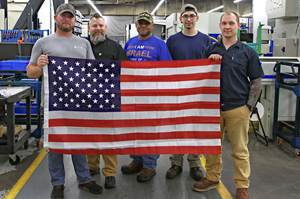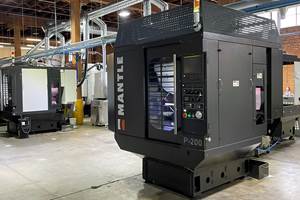Not Every Successful Career Starts with a College Degree
“It’s time to redefine the definition of success.” That was a key point made by CNC Software President Meghan West, who was the keynote speaker at University of South Florida College of Education’s luncheon in Tampa. She explained why specialized training in manufacturing skills may be better career preparation for smart students with a talent for making things.
Share





Meghan West made this wooden reindeer as Girl Scout craft project 25 years ago. At the time, she learned a key lesson about manufacturing—it’s a process by which raw materials become desirable objects of value.
Meghan West, president of CNC Software Inc., developers of Mastercam CAD/CAM software, recently addressed a group of educators and community leaders from across the Tampa Bay area about the compelling need for and benefits of careers in manufacturing. The University of South Florida’s College of Education and the Florida State Fairgrounds hosted the event, the 14th annual Education in Action Luncheon. A diverse group of 300 education stakeholders attended, including teachers, administrators, executives and student leaders.
After apprising the group about the misperceptions of manufacturing, the current skills gap in manufacturing, and the impact that manufacturing has on our everyday lives, Ms. West gave voice to one of the core issues surrounding the lack of interest and knowledge about manufacturing among children and adolescents: “It’s time to redefine the definition of success,” she said. “The default advice, often incentivized, given to kids in middle school and high school is ‘go to college.’ While that’s excellent guidance for some, the traditional four-year-college track is clearly not the best choice for many students. There’s a group of kids out there who are brilliant with their hands and minds, who like to make things, who can fix things. Industry is clamoring for this group. In some cases, with just a year of specialized training, those kids can get very-good-paying jobs immediately and embark on a career path that offers satisfying financial and personal rewards. Isn’t that success, too?”
Supporting the opportunities that Ms. West outlined, she provided the following statistics:
- 48 percent of large manufacturers plan to return production to the United States from offshore.
- Manufacturing costs in the United States are now only 5 percent higher than in China.
- About 66,800 new manufacturing jobs are predicted every year through 2019.
- The average annual earnings for jobs in manufacturing is $77,506, whereas the average annual earnings for all industries is $62,546.
She also reminded the audience that, even for kids who do take the four-year college track, manufacturing companies offer interesting and engaging opportunities for many degreed specialists. For example, in addition to shopfloor personnel, manufacturers employ accountants; marketing, sales and human resource professionals; engineers; and product designers.
“At some point in our lives, manufacturing is new to all of us,” Ms. West said. “Please start enlightening children—girls and boys—that if something isn’t grown or mined from the earth, it’s made by people who know how to use tools and some very cool machines, computers and software. Make it relatable to the car, the fork, the toy. Often, too, the light goes on with just one project made by them.”
In Ms. West’s case, the light went on when she made a wooden gift to earn a Brownies Girl Scout badge about 25 years ago. Ms. West reached under the podium and held up the actual project: a one-inch-thick wooden reindeer adorned with jingling bells and facial decorations. She said her father, one of the founding developers of Mastercam software, helped her program and run the machine that cut out the reindeer form. “And the rest is history,” she said.
Ms. West challenged the group of educators to consider project-based learning as a way to make school more interesting and provided examples of several from Mastercam’s customers. She relayed relevant commentary about that point from Megan Smith, Chief Technology Officer of the United States. Quoting Ms. Smith’s statement, she said: “We have wonderful, wonderful teachers who can’t disrupt their industry because it’s so constrained and bureaucratic. We need to make school way less boring. Instead, a great way to learn is project-based learning. One of the most important things we need to do in the United States is to empower kids to be makers rather than consumers. Project-based learning is more effective and less expensive. All the kids need to be able to do that. The world becomes the classroom, instruction comes from the topics as you need it, and people collaborate on real stuff.”
Ms. West concluded her keynote with the following question to the group: “What can you do to excite the youth of our country about manufacturing?”
Related Content
Manufacturing Madness: Colleges Vie for Machining Title (Includes Video)
The first annual SEC Machining Competition highlighted students studying for careers in machining, as well as the need to rebuild a domestic manufacturing workforce.
Read MoreFinding Skilled Labor Through Partnerships and Benefits
To combat the skilled labor shortage, this Top Shops honoree turned to partnerships and unique benefits to attract talented workers.
Read MoreIn Moldmaking, Mantle Process Addresses Lead Time and Talent Pool
A new process delivered through what looks like a standard machining center promises to streamline machining of injection mold cores and cavities and even answer the declining availability of toolmakers.
Read MoreHow to Pass the Job Interview as an Employer
Job interviews are a two-way street. Follow these tips to make a good impression on your potential future workforce.
Read MoreRead Next
Registration Now Open for the Precision Machining Technology Show (PMTS) 2025
The precision machining industry’s premier event returns to Cleveland, OH, April 1-3.
Read More5 Rules of Thumb for Buying CNC Machine Tools
Use these tips to carefully plan your machine tool purchases and to avoid regretting your decision later.
Read MoreBuilding Out a Foundation for Student Machinists
Autodesk and Haas have teamed up to produce an introductory course for students that covers the basics of CAD, CAM and CNC while providing them with a portfolio part.
Read More





















.jpg;maxWidth=300;quality=90)













